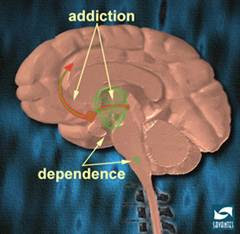Study finds addicts' brains wired differently

Authors say research supports notion that addiction is a disease
Drug or alcohol abusers who relapse, even after long periods of abstinence, are often reviled as too weak or undisciplined to straighten themselves out.
But a UNC Chapel Hill psychologist has found evidence that suggests, in fact, that addicts' brains may be wired in a way that makes them more prone to give in to temptation.
The research, published in the December issue of the Journal of Neuroscience, provides further evidence that addiction is a disease, not a character flaw, says Charlotte Boettiger, an assistant professor of psychology at UNC and lead author of the paper released Tuesday.
"It wasn't that long ago that we believed schizophrenia was caused by bad mothers and depression wasn't a disease," Boettiger said. "Addiction is maybe just a couple of decades behind."
What they did: Boettiger and colleagues peeked inside the brain to see how brain function might be different in a substance abuser.
The study, conducted while Boettiger was at the University of California at San Francisco, used imaging technology to take pictures of sober alcoholics' and nonalcoholics' brains as they chose between immediate and delayed rewards. Alcoholics chose the quick payoff almost three times more often.
What they found: Scans showed that the most impulsive subjects -- most but not all of whom had a history of alcoholism -- had reduced activity in an area of the brain that helps assess rewards and increased activity in other sections of the brain associated with judgment and decision-making. The differences suggest that some addicts may have impaired ability to think through a decision, Boettiger said. Blood tests implicated a variant gene.
What it means: More study is needed, but Boettiger said the findings suggest new treatment approaches for addiction. Drugs for early-onset Alzheimer's disease and Parkinson's disease target the same regions of the brain, so those medicines may also be useful for alcohol or drug addiction.
source: JEAN P. FISHER
(Raleigh) News & Observer
http://www.charlotte.com/


